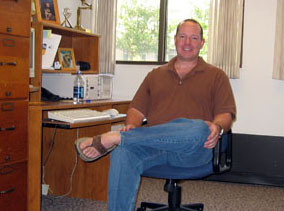Dr. Keith A. Bauer
The Milwaukee Journal Sentinel article Marquette professor looks at growing debate of using technology to enhance humans said
“We can’t decide whether to embrace or strangle our inner cyborg.The ‘Bionic Man/Bionic Woman’ in us gives thanks for microchips that help our damaged bodies, pills that keep our brains happy and focused, Palm Pilots that put information in our hands and eye implants that improve our vision.
But will we welcome a future that includes: designer children, their brains 20% smarter and wiped clean of the most violent impulses; older adults living 20 years longer than today; wireless links connecting our brains to e-mail transmitters; perhaps even human eyes endowed with night vision?
This is the brave new world Marquette University assistant philosophy professor Keith A. Bauer examines in a forthcoming paper titled Wired Patients, due to be published this year in the Cambridge Quarterly of Healthcare Ethics.
In the paper, Bauer describes how electrodes inserted into the brain help patients regain functions lost to strokes and spinal cord injuries. About 200 Americans so far have had the VeriChip, a microchip the size of a grain of rice, implanted in their arms, where it stores medical information that can be retrieved and viewed by a doctor with the sweep of a scanner the size of a calculator.”
Keith A. Bauer, M.S.W., Ph.D. is Assistant Professor, Philosophy Department, Marquette University.
Keith’s primary research interests are in applied health-care ethics, ethical theory, and some metaethics (cognitivism, non-cognitivism, realism, anti-realism, and moral skepticism). Much of my research has focused broadly on the ethical and social aspects of using information technology to provide and to manage health-care services (e.g., the implications of electronically mediated interactions on provider-patient relationships, privacy, and distributive justice). He is currently writing a paper on transhumanism, which addresses arguments for and against the unrestricted modification of humans by means of genetic manipulation, bio-implants and nanotechnology.
As a member of a taskforce sponsored by the FDA and NSF in April 1999, he helped to author “Appropriate Design of Home Health Technologies: Ethical, Legal, and Policy Considerations”, which can be found in The Report of the Workshop on Home Care Technologies for the 21st Century (Washington, D.C.: Catholic University of America Press, 1999).
Keith authored Wired Patients: Implantable Microchips and Biosensors in Patient Care, Home-Based Telemedicine: A Survey of Ethical Issues, Using the Internet to Empower Patients and to Develop Partnerships with Clinicians, Covert Video Surveillance of Parents Suspected of Child Abuse: The British Experience and Alternative Approaches, Distributive justice and rural healthcare: a case for e-health, and coauthored Ethical Issues in Tissue Banking for Research: A Brief Review of Existing Organizational Policies.
He earned his B.A. from Mary Washington College in 1989, his M.S.W. from Virginia Commonwealth University in 1993, his M.A. from Duquesne University and University of Pittsburgh in 1995, and his Ph.D. from University of Tennessee Knoxville in 2001.
Keith teaches Theory of Ethics, Human Nature, Nursing Ethics, Business Ethics, Medical Ethics, and Ethics and Information Technology. He is a member of the American Philosophical Association, American Society for Bioethics and Humanities, and the Association for Practical and Professional Ethics. Read Of humans and cyborgs.
